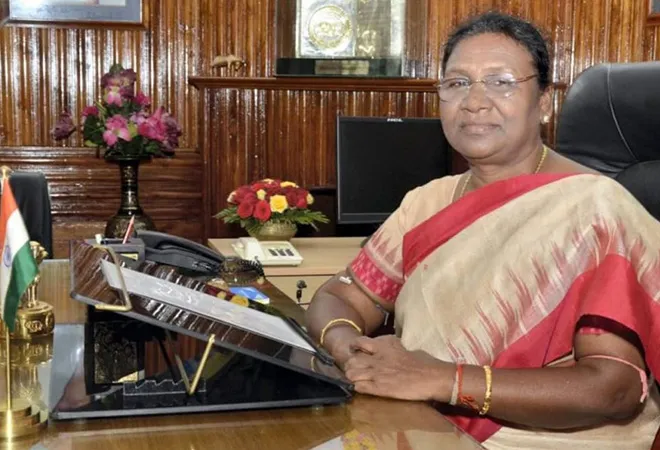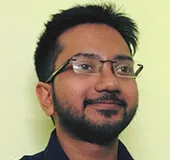
In the
recently concluded Presidential election, Droupadi Murmu got elected as the 15
th President of India. Her elevation to the position of the country’s head of state is hailed as a historic moment. This is primarily because Murmu is India’s first tribal and the youngest woman President. Murmu’s thumping victory in the presidential election has been rapturously welcomed by all sections transcending the political spectrum.
Murmu contested the election as the candidate of the ruling BJP-led NDA primarily against the veteran political leader, Yashwant Sinha, who ran for the presidential election as the joint candidate of the Opposition parties in India. Murmu won the election by receiving 64.03 percent of the total votes polled. Apart from the parliamentarians and legislators of the NDA, many non-NDA parties such as YSRCP, BSP, SAD, Shiv Sena, and JMM including some prominent political opponents of the BJP-led NDA, expressed their support and voted for Murmu in the election.
Murmu contested the election as the candidate of the ruling BJP-led NDA primarily against the veteran political leader, Yashwant Sinha, who ran for the presidential election as the joint candidate of the Opposition parties in India.
A symbol of democratic emancipation
Murmu’s election as president carries immense symbolic significance and hope. It is, indeed, historic in the discourse of India’s social justice politics as India not only has never had a president from the tribal community before but the country has also hardly witnessed a rise of many prominent national political leaders from the marginalised Scheduled Tribe community. Murmu’s inspirational journey from her humble origins as a tribal leader from Rairangpur in the Mayurbhanj district in Odisha to the Rashtrapati Bhavan is an undeniable testimony of India’s democratic credentials. She started her political career at the grassroot level in the local body, eventually got elected as BJP MLA and worked as a minister in the BJD-BJP government in Odisha from 2000 to 2004. She also served as the Governor of Jharkhand from 2015 to 2021. Since the declaration of her candidature as NDA’s presidential nominee, there has
been celebration
amongst the tribal communities across the country as her rise to India’s highest constitutional office embodied a sense of symbolic emancipation and recognition of the marginalised tribal people in India. Her background and her previous efforts to protect tribal land rights during her stint as Jharkhand governor raise the
expectations that as president she will boost the focus on the marginalisation and plight of the ST community in the country and will ensure greater protection of these vulnerable sections of the society.
Underlining the salience of the office of president
In India, the president is the head of the state and is indirectly elected by the electoral college which is constituted of the members of the Parliament and members of all legislative assemblies. The Constitution lays down that the President should act as per the aid and advice of the prime minister and the Council of Ministers. However, that doesn’t entail that the office of the President of India is entirely titular in nature. As
observed by political scientist, James Manor, there are certain conditions under which the President of India can perform an indispensable function of providing a stable democratic government and preserving the sanctity of the Constitution. For instance, in case no party is able to get an absolute parliamentary majority in the national elections or the ruling party has lost its majority, the president has the power to decide which party forms the government. The president also takes a call on the sitting PM’s advice to dissolve the Parliament and decision on calling for snap elections, though all presidents have agreed to such advice till date. When strong national governments with a comfortable parliamentary majority remain in power, the probability of the president using her abovementioned discretionary power is limited. This has been witnessed during the time of one-party dominance of the Congress in the past (1947–1989) and, therefore, in the present phase of BJP’s political dominance with a strong parliamentary majority, such a situation of political crisis where the president needs to exercise such powers is unlikely.
In case the president has reservations about the bill, she can exercise the discretionary power of ‘Pocket Veto’ by not taking any action on the bill—neither sign it nor send it back to the Council of Ministers for reconsideration.
However, another crucial discretionary power of the President of India is to ratify the bills passed by the Parliament. In case the president has reservations about the bill, she can send it back (except Money Bill) to the Council of Ministers with her recommendations. If the Council of Ministers returns the bill without incorporating the recommendations, the president is compelled to give formal assent to the bill. In case the president has reservations about the bill, she can exercise the discretionary power of ‘Pocket Veto’ by not taking any action on the bill—neither sign it nor send it back to the Council of Ministers for reconsideration. In that case, the bill remains pending till the end of the President’s tenure. Interestingly, Murmu during her stint as Governor of Jharkhand sent back the Chota Nagpur Tenancy Act to the then Raghubar Das-led BJP government with queries, exercising her gubernatorial discretion seen to be in the interest of tribal welfare. So, it will be interesting to see how she exercises her new powers as the protector of the Constitution and champion of public welfare within the constitutional limits earmarked for the office of the president.
In precis, Droupadi Murmu’s humble origins and inspirational political journey have showered her with support and admiration from all sections of the political spectrum. The sanctity of the office of the president lies in remaining above the vagaries of partisan politics and offering larger stability
as a ‘symbol of national unity’. At a time when the Indian political landscape witnesses contentious political partisanship over a host of crucial issues, the clout and the goodwill of the new president will be crucial in building political bridges for the larger purpose of public welfare and stable governance.
The views expressed above belong to the author(s). ORF research and analyses now available on Telegram! Click here to access our curated content — blogs, longforms and interviews.



 In the
In the  PREV
PREV


